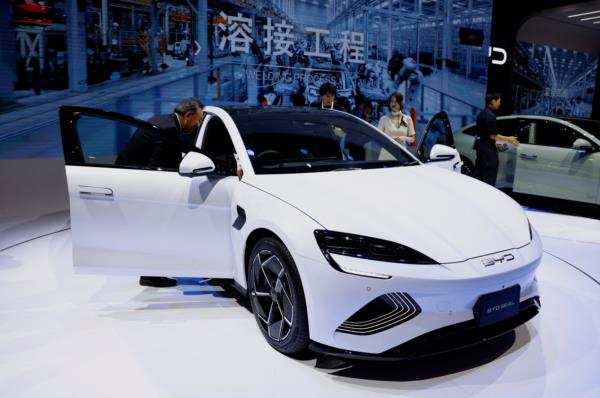
China's new energy vehicle (NEV) sales, which include electric and hybrid vehicles, have experienced a decline month-on-month (m/m) for the first time since August. This development comes as a surprise, considering the country's efforts to promote the adoption of environmentally friendly vehicles.
According to the China Association of Automobile Manufacturers (CAAM), NEV sales in China totaled 144,000 units in September, representing a decrease of 34% compared to the previous month. Experts speculate that this drop could be attributed to various factors, including the elimination of purchase subsidies and the global semiconductor shortage.
One significant factor impacting the NEV market is the decrease in government subsidies. In recent years, the Chinese government has been providing significant financial incentives to encourage consumers to buy NEVs. However, these subsidies have been gradually decreasing since 2019 and were completely eliminated in some cities earlier this year. This sudden change has led to a decline in consumer demand, particularly among price-sensitive buyers.
Another key factor influencing NEV sales is the global semiconductor shortage. This shortage has disrupted the automotive industry worldwide, leading to reduced production capacities and delayed deliveries. As NEVs rely heavily on advanced electronics and computer chips, this industry has been particularly affected. Consequently, the limited supply of NEVs in the market has also contributed to the decline in sales.
Furthermore, China's overall automotive market has been facing challenges in recent times. Due to rising prices of raw materials, such as steel and semiconductors, the cost of manufacturing vehicles has increased significantly. This has led to higher selling prices, which in turn have deterred some potential buyers. Additionally, the ongoing COVID-19 pandemic has disrupted supply chains and dampened consumer confidence, further impacting the overall automobile sales.
Despite the decline witnessed in September, it is worth noting that NEV sales in China for the first nine months of this year still increased by 182% compared to the same period last year. This demonstrates the long-term growth potential of the NEV market in China, which remains the world's largest market for electric vehicles.
To further support the NEV industry, the Chinese government has recently announced plans to extend the purchase tax exemption for NEVs until the end of 2023. Additionally, the government aims to enhance the charging infrastructure and expand the network of charging stations across the country, addressing one of the key concerns of potential NEV buyers - charging accessibility. These measures are expected to stimulate demand and help sustain the growth of the NEV market in the coming years.
In summary, China's NEV sales experienced a decline in September, marking the first drop in nearly a year. The elimination of purchase subsidies and the global semiconductor shortage are believed to be the primary factors contributing to this decline. However, despite this setback, the long-term growth potential of the NEV market in China remains strong. The government's ongoing efforts to support the industry through tax exemptions and infrastructure development will likely help revive sales and propel the development of environmentally friendly vehicles in the country.







